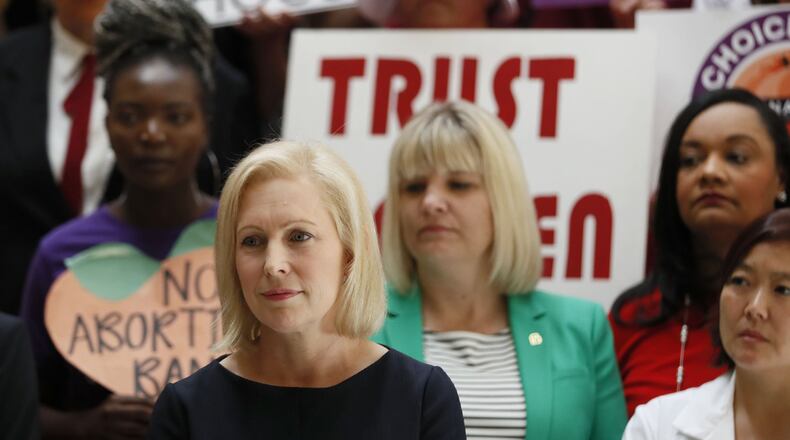Democratic candidates for president have made their opposition to Georgia's heartbeat law and a wave of anti-abortion measures in other states a central part of their campaigns.
U.S. Sen. Kirsten Gillibrand, D-N.Y., told Georgia’s abortion rights advocates at the state Capitol that she was on their side.
“I’m am proud to be here in Georgia today to stand shoulder to shoulder with these women and the millions of people around the country who are outraged and fighting for our reproductive and civil rights,” Gillibrand said after hosting a roundtable discussion involving abortion rights activists, providers and state Democratic lawmakers.
“I am here to not only learn from you, but I intend to use my platform to not only shine a light on what’s happening here in Georgia … I will also lead the fight for women’s rights and civil rights across the country,” the presidential hopeful said.
>> Kemp signs anti-abortion ‘heartbeat’ legislation, sets up legal fight
Abortion rights groups vow payback as Kemp preps to sign ‘heartbeat’ bill
Gov. Brian Kemp and other conservatives made anti-abortion legislation a top priority this year in hopes it will land before the U.S. Supreme Court.
The new law, which goes into effect in January, outlaws most abortions after about six weeks of pregnancy — before many women are aware they are pregnant.
Later abortions still will be allowed in instances of rape, incest, if the life of the mother is at risk, and in cases of medical futility. Those who have been victims of rape or incest must file a police report to get an abortion after six weeks.
In response to a surge in anti-abortion legislation — Georgia became the fourth state this year to pass a "heartbeat" measure — Democratic presidential candidates have increasingly condemned what they see as efforts to restrict reproductive rights.
That intensified this week after Alabama Gov. Kay Ivey signed a bill Wednesday that outlaws abortions at every stage of pregnancy and makes performing the procedure a criminal offense. It includes an exception for cases when the mother’s life is in danger, but not for rape or incest.
That led to a torrent of new criticism from every leading Democratic candidate, including several who cast Alabama’s legislation in the same breath as the less-restrictive — but still far-reaching — Georgia bill.
For candidates, the anti-abortion legislation offers them an opening to energize their party's left-leaning base. An Atlanta Journal-Constitution poll last month found that roughly two-thirds of Democrats in Georgia lined up against the state's "heartbeat" measure, House Bill 481.
And after the legislation cleared Georgia’s General Assembly earlier this year, it’s become a rite of passage for White House hopefuls to criticize the measure and Kemp as they pass through Georgia.
Georgia Democratic Party Chairwoman Nikema Williams said that’s because Georgia has become a battleground state in the 2020 presidential election.
“The road to the White House comes through Georgia,” said Williams, who is also a state senator from Atlanta. “The fact that a presidential candidate is here holding a press conference with all of this national media and local media on a local bill shows the importance … of our voters in getting someone elected — not just in the primary, but in the general election — to the presidency.”
At a town hall in Atlanta earlier this year, former Colorado Gov. John Hickenlooper said he would "immediately" challenge the measure in court if he were in the Oval Office. And U.S. Sen. Cory Booker of New Jersey told the AJC it was a "full-frontal assault" on the U.S. Supreme Court's Roe v. Wade decision that legalized abortion in 1973.
“We can stop them by codifying Roe v. Wade into law,” he said. “And we can stop them by saying we are going to firmly establish protections for women so they can access health care services that are essential for their health and well-being.”
The Alabama measure gave new urgency to the candidates’ pushback. Former Vice President Joe Biden, who has yet to campaign in Georgia, criticized Republicans in Alabama, Georgia and other states spoiling for a Supreme Court battle.
"Roe v. Wade is settled law and should not be overturned," he said. "This choice should remain between a woman and her doctor."
Kemp is facing growing fallout from left-leaning critics, including Hollywood celebrities who have called for boycotts of the state. Amid threats of protest, he postponed a trip to Los Angeles this week to court studio executives.
Pressed at a recent stop, Kemp said he's not worried about economic backlash.
“I’ve said many times: We can’t run from our values in this state,” Kemp said. “Our business environment is great. And I’m a huge supporter of our film industry.”
Stay on top of what’s happening in Georgia government and politics at www.ajc.com/politics.
Keep Reading
The Latest
Featured




